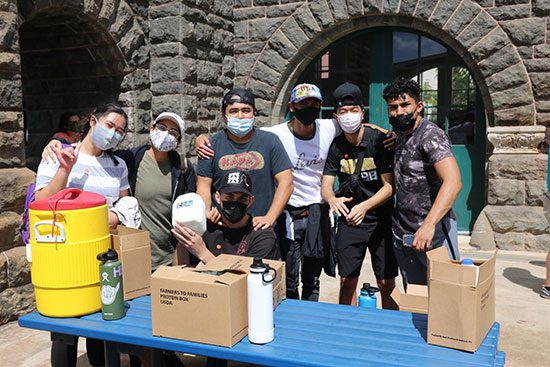
After the backlash that he received when Executive Order 13769 was released on Jan. 27, President Donald Trump rolled out Executive Order 13780 on March 6 that makes significant revisions to guard against legal challenges.
When Trump issued the original travel ban, it took effect immediately. Pre-approved refugees, students and workers holding visas and residency green cards were barred from flights to the U.S. Opponents of the ban gathered at major airports across the country, including Honolulu, to protest.
In the new executive order, the Trump administration inserted a 10-day grace period, giving it enough time to iron out kinks in implementation.
The original travel ban barred entry to the U.S. from seven Muslim majority countries. Individuals from Iran, Iraq, Libya, Somalia, Sudan and Yemen were barred for 90 days while existing screening and vetting procedures were under review, while Syrian refugees were banned indefinitely.
In the new order, Trump continues to impose the 90-day ban on travellers but removed Iraq from the list at the request of Secretary of Defense Jim Mattis, who feared it would hamper coordination to defeat the Islamic State, according to administration officials.
The new executive order also exempts residents and current visa holders and removed a provision that arguably prioritizes certain religious minorities. In addition, it replaces the indefinite ban on refugees from Syria with a 120-day freeze.
Both executive orders suspend the U.S. Refugee Admissions Program (USRAP), which is responsible for screening and admitting refugees, for 120 days due to the number of “terrorist groups (that) have sought to infiltrate several nations through refugee programs,” as stated in Executive Order 13769. However, the secretary of state and the secretary of homeland security can grant case-by-case waivers if they determine it’s in the national interest to do so.
In the new executive order, the Trump administration identified nine categories of visitors who can qualify for case-by-case waivers, including individuals with a close family member who is a U.S. citizen or legal resident, as well as a young child or infant who needs urgent medical care in the U.S. The new executive order offers few specifics on how qualified visitors could apply for the waiver.
Below is a brief summary according to Executive Order 13780 on why individuals from each country are being denied entry.
Iran
Iran has been a state sponsor of terrorism since 1984, according to the new executive order, and has been linked to support for al-Qa’ida, a Muslim extremist group founded by Osama Bin Ladin, and does not cooperate with the U.S. in counter-terrorism efforts.
Libya
Libya is an active combat zone with hostilities between the internationally recognized government, headed by Prime Minister Fayiz al-Saraj, and its rivals. In many parts of the country, security and law enforcement are provided by armed militia rather than state agencies, which Islamic State extremist militia have exploited to expand their presence in the country. The Libyan government cooperates with U.S. counterterrorism efforts but is unable to secure thousands of miles of its land and maritime borders, enabling illicit flow of weapons, migrants and foreign terrorist fighters.
Somalia
Portions of Somalia have been safe havens for terrorist groups like Al-Shabaab, an al-Qa’ida-affliated terrorist group. Somalia also has porous borders and most countries do not recognize Somali identity documents. The Somali government cooperates with the U.S. in some counterterrorism operations but doesn’t have the capacity to sustain military pressure or to investigate suspected terrorists.
Sudan
Sudan has been designated as a state sponsor of terrorism since 1993 because of its support for international terrorist groups. Historically, Sudan has provided safe havens for al-Qa’ida and other terrorist groups to meet and train. Although Sudan’s support of al-Qa’ida has ceased and the country cooperates with U.S. counterterrorism efforts, elements of core al-Qaida and ISIS-linked terrorist groups remain active in the country.
Syria
Syria has been designated as a state sponsor of terrorism since 1979 and the Syrian government, headed by President Bashar al-Asad, is engaged in an ongoing military conflict against ISIS and other terrorist groups for control of portions of the country. At the same time, Syria continues to support other terrorist groups and has allowed extremists to pass through its territory to enter Iraq. Syria does not cooperate with U.S. counterterrorism efforts.
Yemen
Yemen is the site of an ongoing conflict between the incumbent government, led by President Abdrabbuh Mansour Hadi, and the Houthi-led opposition. ISIS has exploited this conflict to expand its presence in Yemen to carry out hundreds of attacks on locals. Weapons and other materials that have been smuggled across Yemen’s porous borders are used to finance the al-Qa’ida in the Arabian Peninsula and other terrorist activities. Yemen has been supportive of but unable to fully cooperate with the U.S. in counterterrorism efforts.
Hawai‘i v. Trump
Hawai‘i’s Attorney General Douglas S. Chin was the first in the country to file a lawsuit over the revised travel ban. In a 40-page amended complaint, Chin argued that the new order will “immediately threaten grave harm” to the state and its co-plaintiff Ismail Elshikh, who is the imam of the Muslim Association of Hawai‘i.
Hawai‘i argued two key points about the travel ban: that it discriminates against Muslims and that it will negatively impact the state’s tourism industry.
“The new executive order means that Hawai‘i will be unable to honor the commitments to nondiscrimination and diversity embodied in the state’s Constitution, laws and policies,” Neal Katyal, a lead attorney on the lawsuit, wrote in the complaint. “Its implementation also means that the state will be forced to tolerate a policy that disfavors one religion and violates the establishment clauses of both the federal and state constitutions.”
“It is damaging Hawai‘i’s institutions, harming its economy, and eroding Hawai‘i’s sovereign interests in maintaining the separation between church and state as well as in welcoming persons from all nations around the world into the fabric of its society,” Chin wrote in the amended complaint.
The attorney general’s office also filed a motion for a temporary restraining order (TRO) asking U.S. District Court Judge Derrick Watson, who resides in Hawai`i, to block the travel ban from taking effect on March 16. The TRO was approved hours before the original travel ban was set to go into effect. The TRO also included the second executive order and will remain in effect until the lawsuit is resolved. This ruling means that travelers from the six countries and refugees are able to travel to the U.S.
Trump denounced Watson’s ruling during a rally in Nashville, Tennessee in March. “This is, in the opinion of many, an unprecedented judicial overreach,” Trump said before pledging to take the issue to the Supreme Court if necessary.
States of Washington and Minnesota v. Trump
The states of Washington, California, Maryland, Massachusetts, New York and Oregon are also challenging Executive Order 13780 for violating constitutional guarantees including the Equal Protection Clause, a part of the Fourteenth Amendment that provides that no state shall deny to any person within its jurisdiction “the equal protection of the laws,” Due Process, found in the Fourteenth and Fifteenth Amendment which states “no person (or state) … shall be deprived of life, liberty, or property without due process of law,” as well as the Establishment Clause’s prohibition on government attempts to establish a disfavored religion.
by Deborah Higa, Ka ‘Ohana Co-Editor in Chief





